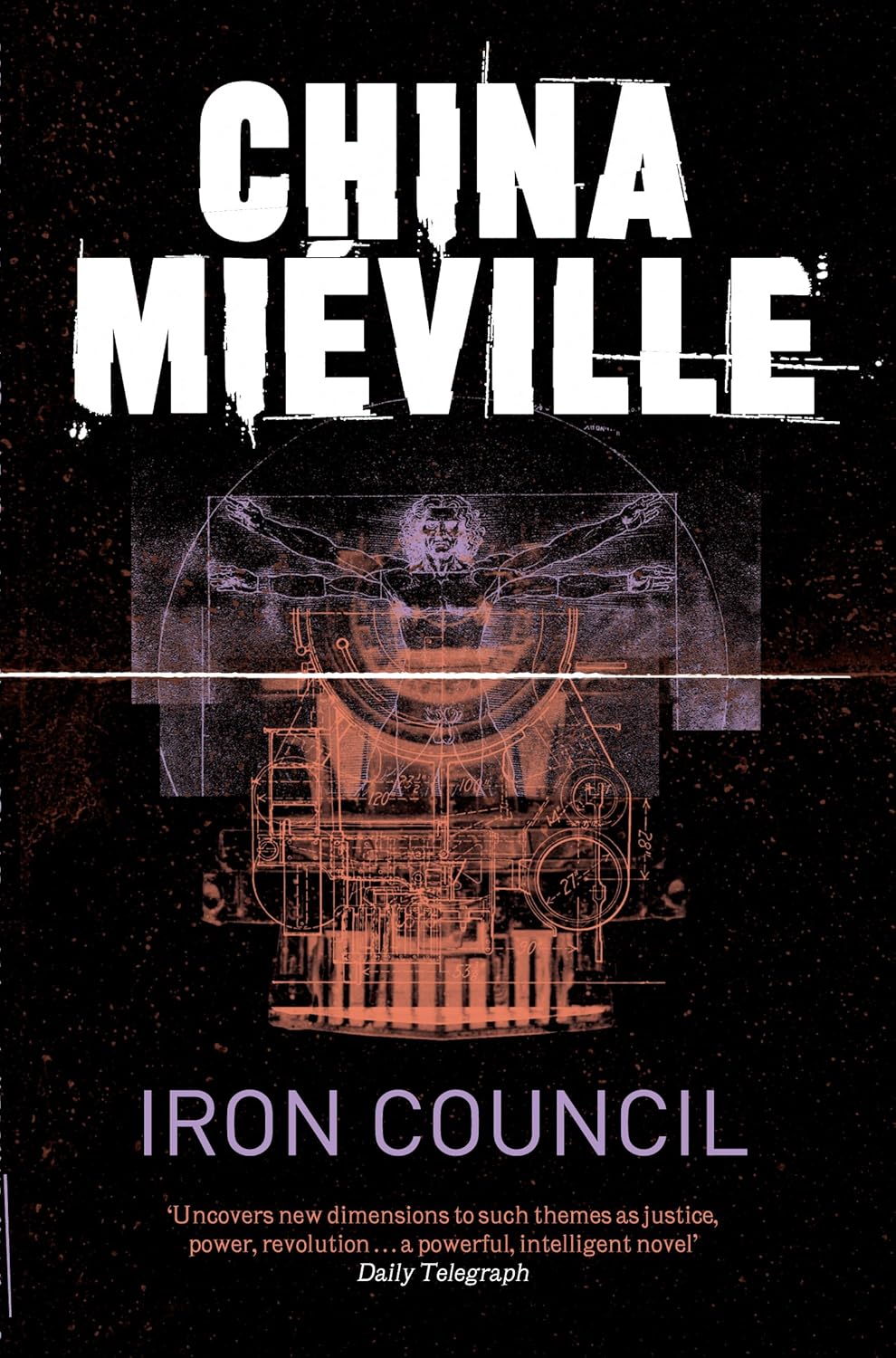Written
by: China Miéville
It is a time of
revolts and revolutions, conflict and intrigue. New Crobuzon is being ripped
apart from without and within. War with the shadowy city-state of Tesh and
rioting on the streets at home are pushing the teeming metropolis to the brink.
In the midst of this turmoil, a mysterious masked figure spurs strange
rebellion, while treachery and violence incubate in unexpected places. In
desperation, a small group of renegades escapes from the city and crosses
strange and alien continents in the search for a lost hope, an undying legend.
In the blood and violence of New Crobuzon's most dangerous hour, there are
whispers. It is the time of the Iron Council.
The third and perhaps final instalment in Miéville’s Bas-Lag
cycle (he’s been busily working on other fiction since, but calling it a cycle
suggests space for continuation), ‘Iron Council’ is perhaps the most normal
book he’s written, at least of the ones I’ve polished off; this is something of
a mixed blessing, in practice.
On the positive side, it’s an infinitely more accessible
book than either of its predecessors. True, with Miéville, accessible is a
distinctly relative term; the Bas-Lag cycle consists of ‘Perdido Street
Station’, a deeply unsettling tale of dream-eating moths in the weird dystopia
of New Crobuzon, ‘The Scar’, a tale of pirates trying to harness the power of
the titular crack in reality, and of course, ‘Iron Council’ itself, a tale of
political revolution. Think of it as ‘Les Misérables’ with magic, insect
people, walking cacti and eldritch abominations and you’re not too far off.
Such a description might not fit traditional ideas of ‘normal’, but you’ve got
to put it in context.
Told from the perspective of three characters of differing
ideologies and involvement in said revolution, it’s a novel that takes no
prisoners, but beyond the outlandish settings and characters the tale itself is
familiar, and Miéville crams in various different facets to it. For much of the
book, the revolution itself is side-show while two of the characters cross the
world in search of the titular Council, telling both the story of the quest to
find it, and flashbacks to its origins in Bas-Lag’s industrial revolution (readers
of previous instalments in the series may find some of the chronology a little
confusing at first – ‘Iron Council’ is set twenty years or so after the first
two books, with the flashbacks apparently taking place at some point prior to
or concurrently with those books). The tale of the Council is easily the more
interesting, in large part due to somewhat more interesting characters – the
main character in this section is one Judah Low, a self-declared ‘bard’ of the
Council with a penchant for creating golems out of whatever comes to hand
(grass, dirt, corpses…) who will have you going back and forth on whether he’s
a visionary bordering on sainthood or an aloof, self-righteous git – and
definitely more interesting locales, a fair chunk of the storyline being set
within a region of the world where reality has worn a little thin, and standing
in the wrong place can result in interesting times.
This is not to say that the New Crobuzon set plot-line is
lacking, particularly; it is simply a more traditional tale, and much of the
essential weirdness of New Crobuzon itself is sidelined in favour of the
politics. The main character for this section, Ori, is engaging and well
written enough, but is a relatively generic frustrated activist taking part in
the traditional revolutionary activities of murder and destruction.
This is where the relative normality of the book becomes a
mixed blessing. Miéville has three major strengths as a writer, his ideas, the
writing itself, and a willingness and ability to tackle bigger themes than the
average fantasy, and in ‘Iron Council’ the ideas simply aren’t as distinctive
as in his other works. Consequentially, the themes are exposed to more intense
scrutiny, and you may be left wondering whether he is taking an attitude of deliberate
vagueness to prompt the reader to think or whether he is simply paying
lip-service to those lofty ideas. Or possibly whether he’s just that much more
intelligent than you, which is a feeling I’m familiar with from his previous
work.
In addition to arguably drawing attention to other flaws
though, there is a more immediate problem, in that the different plot lines are
neither given enough room to breathe nor meshed together terribly well. While
both are linked thematically by discussion of revolution and freedom, they
spend too long apart, only coming together in the final hundred pages or so, at
which point everything is wrapped up pretty swiftly, but not necessarily
satisfactorily (in some ways, this is an issue in all three Bas-Lag books, but
because ‘Iron Council’ is a somewhat lesser book overall, it is much more
obvious here).
However, the most obvious of Miéville’s strengths is in full
force once more. He is truly an astonishing writer, with a slightly odd style
that at once stands apart from proceedings, almost more descriptive than
anything else, but never failing to involve you with the characters or the
plot. Even in the areas of the novel that are weaker in terms of plotting,
there’s a hypnotic quality to the writing that perfectly fits the beautifully,
weirdly grotesque world of Bas-Lag, and in general terms I would have little
hesitation in saying that Miéville is probably the finest fantasist, on a
purely technical level, since Mervyn Peake.
Ultimately, any issues with ‘Iron Council’ are more a
consequence of Miéville’s own high standards. He set the bar incredibly high, especially
with the marvellous ‘The Scar’, so to follow up with a merely very good novel
is no bad thing at all.

No comments:
Post a Comment